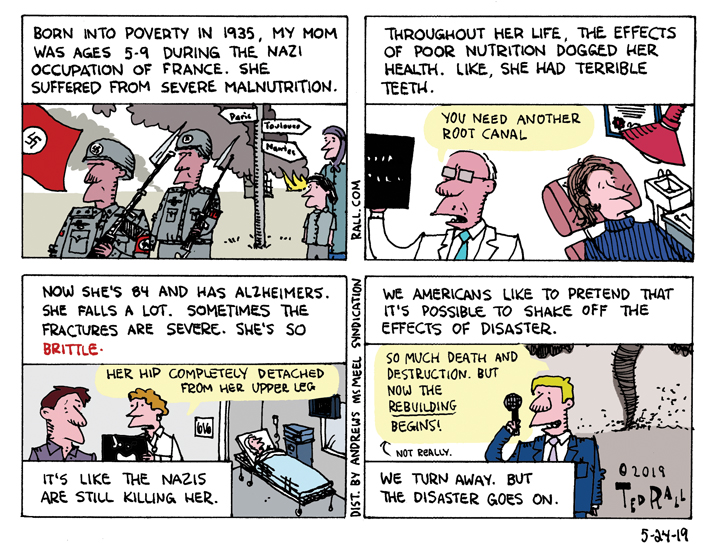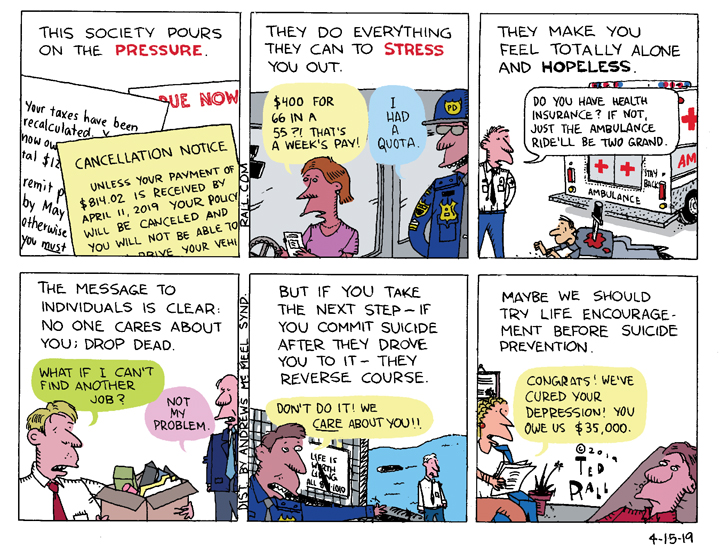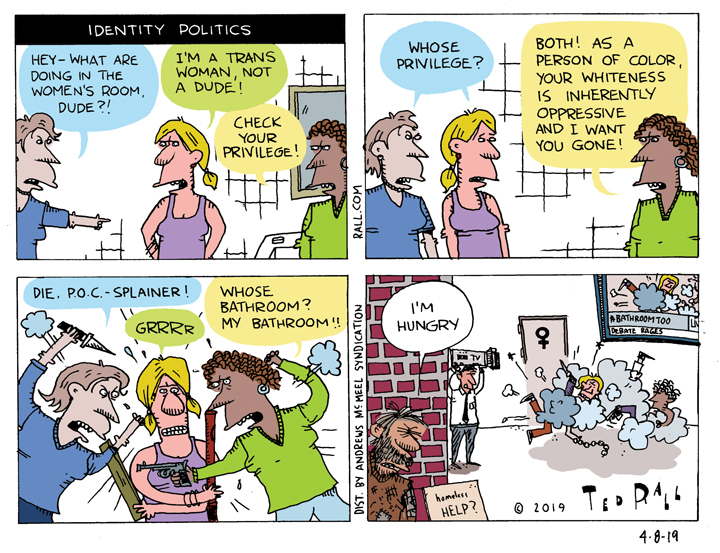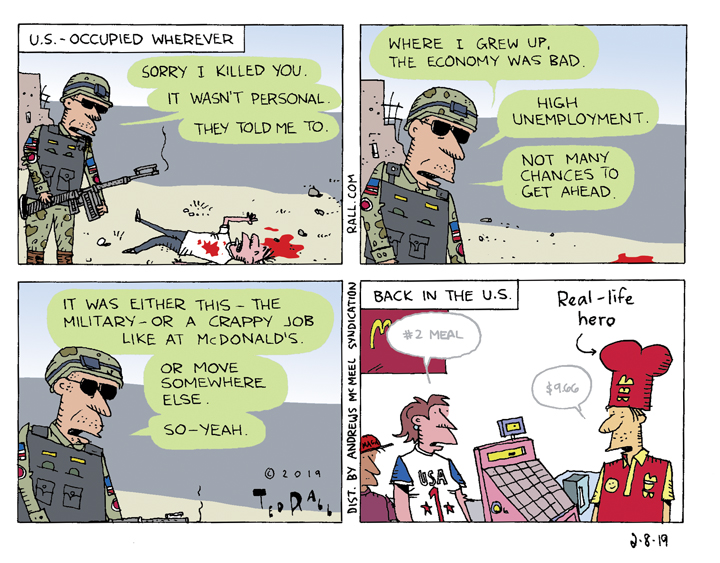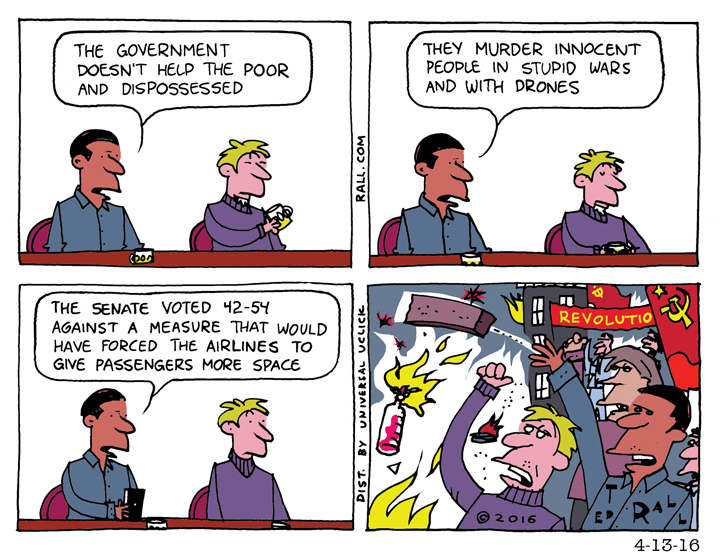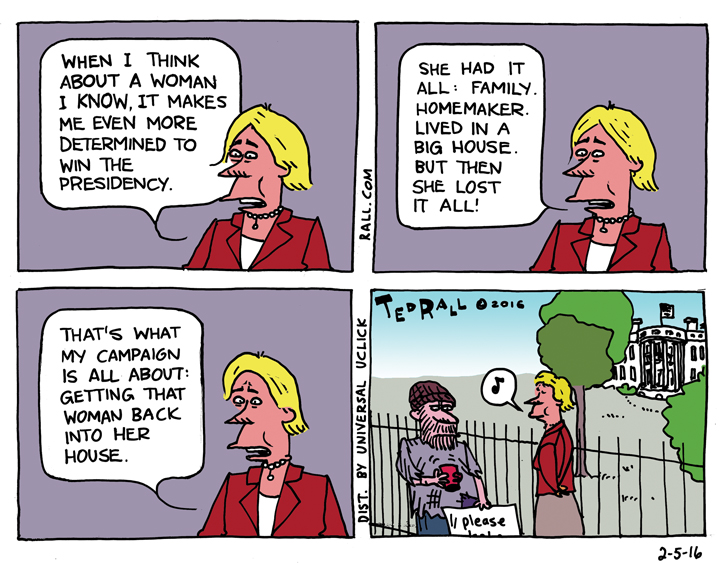Americans often downplay the long-term effects of traumatic experiences, expecting victims to pick themselves up, dust themselves off, and move on after a disaster. But as my mother’s experience as an elderly French-American shows, often the negative effects never go completely away.
Identity Politics Made Simple
For most of the 20th century left-of-center politics was defined by class struggle between the rich and the poor. Now the left has been completely subsumed by identity politics, the struggles for historically disadvantaged demographic groups for equality. Unfortunately the class struggle (which largely drove the oppression of women and minorities) has been all but forgotten by mainstream liberal politicians and political parties.
Who’s the Real Hero? Not the Person Who Enlists in America’s Murderous Military
Apologists for militarism, particularly liberal Democrats, justify those who enlist in America’s murderous military by saying that many soldiers come from parts of the country where good jobs are hard to come by. It’s time to point out that the real act of heroism is personal sacrifice rather than killing innocent people overseas for a slightly better paycheck and benefits.
SYNDICATED COLUMN: Trump Voters’ Message: We Exist
I think it was over Thanksgiving dinner. My mother’s best friend, a dear woman who has never been other than good to me and my mom, decided to poke some gentle fun, Dayton Ohio-style, at me.
Actually, let me be more specific. It wasn’t Dayton. The conversation took place in Kettering. It’s a suburb of Dayton. A small suburb called Oakwood separates Dayton and Kettering.
“Ted,” my mom’s friend began, “what’s with these terrible descriptions of our city? The way you write, you’d think this was some bleak post-industrial wasteland.” She motioned out the window to her manicured lawn, punctuated by a set of perfect flowers. As were those of her neighbors. As if to drive home her point, a bird chirped.
I held my ground. “What about down by Route 4? Rusted-out factories, meth houses. It’s like a war zone.”
“But that’s” — she searched for the word — “downtown. That’s not here.”
“It’s five or six miles, at most,” I pointed out. “You can walk there!”
And you can, if you don’t much care about personal safety.
Dayton is a mess. Once a booming manufacturing city, its population is plunging, having shrunk by half in 50 years. Its housing stock, including historical buildings, have been gutted. After decades of factory and corporate closures accelerated by free trade deals like NAFTA, the local economy sucks. Crime, driven by my hometown’s status as Ground Zero of the national opiod epidemic that has turned so many young men into corpses that the morgue ran out of room, has made Dayton even more dangerous than Chicago. The 2008-09 housing crisis left countless homes abandoned (but cheap! you can buy one for four figures). Fearing eviction in 2009 but receiving no help from a government who instead gave $7.77 trillion to the banks with no strings attached, one poor guy hanged himself; a kid found his mummified body five years later. He should have stuck around. The banksters never bothered to foreclose on his modest house.
So much misery, so little help from the government. Four out of five Ohioans who lost their jobs receive zero unemployment benefits.
Downtown Dayton, and its citizens, were dead to my mom’s friend. But not to me. I used to take the bus there to look at record stores and attend meetings at Democratic Headquarters. Sometimes, yes, I walked. After I left Dayton for New York, the road from the Dayton airport to my mom’s house sometimes took me through downtown. Downtown was real. Downtown existed.
If downtown Dayton was less than afterthought to suburbanites a hop, skip and jump away, it was a black hole as far as the national media and the political strategists were concerned. Daytonians didn’t donate to presidential campaigns. (They couldn’t afford to.) More than 40% black as the result of postwar “white flight” to suburbs like Kettering and Oakwood, downtown was reliably Democratic. Republicans didn’t bother; Democrats took Dayton for granted.
You’ve probably already figured out that this essay is a parable about the Rise of Trump. Downtown Dayton was far from unique. There were downtown Daytons all over the post-industrial Midwest: ignored, forgotten, taken for granted. Ohio, Pennsylvania, Wisconsin — states Hillary Clinton ought to have won, and was so sure she was going to win that she hardly showed up, but went Republican in 2016.
Dayton Congressman Tony Hall (disclosure: I worked for one of his campaigns) watched the growing chasm between his working-class — and unemployed poor — constituents and the national Democratic Party, in thrall to the Clintons, free trade, and Wall Street contributors. “A lot of Democrats in the Midwest feel that they didn’t leave the Democratic Party — they feel like the Democratic Party left them,” Hall says. That was me, for sure. “As long as we had our 10 or 12 auto plants, we were pretty good, but we felt that the NAFTA deal made it a lot easier for companies to go to Mexico — and they did. They shut down our factories,” remembers Hall. Young adult voters “saw their moms and dads lose their jobs and they didn’t think anyone did anything for them.”
Day after day, the citizens of Dayton and Flint and Milwaukee opened their newspapers and flipped the cable news channels. Never, ever was there anyone talking about, much less interested in solving, their problems. As far as the elites — and that included Democratic politicians like Hillary — were considered, victims of rapacious global capitalism didn’t exist and didn’t matter.
Until Trump.
Trump didn’t offer credible solutions. He hasn’t lifted a finger to help Rust Belters as president. What he did do was acknowledge their existence.
Writing about the French election, Édouard Louis wrote that a similar cri de Coeur motivated many Marine Le Pen voters. Louis grew up poor: “In the minds of the bourgeoisie…our existence didn’t count and wasn’t real.” That was the message of many Trump voters to the op-ed writers of The New York Times: we know he isn’t perfect, but at least he knows we exist.
Despite Bernie (and Trump), the Hillary Clinton Democrats still don’t get it. When Trump mentioned “mothers and children trapped in poverty in our inner cities, rusted out factories scattered like tombstones across the landscape of our nation” in his inaugural address, my liberal New York friends shook their heads. Like my mom’s friend, they had no idea what Trump was talking about.
The misery is real.
They exist — sometimes they exist five or six miles away.
“They” are us.
(Ted Rall (Twitter: @tedrall) is author of “Trump: A Graphic Biography,” an examination of the life of the Republican presidential nominee in comics form. You can support Ted’s hard-hitting political cartoons and columns and see his work first by sponsoring his work on Patreon.)
SYNDICATED COLUMN: Thanks to Trump, No More Ameri-Splaining
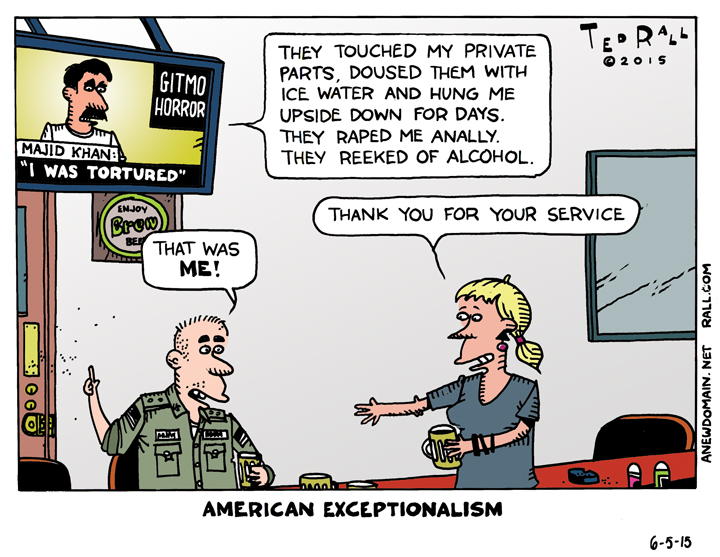
“A shining city on a hill,” Ronald Reagan called America (by way of the Puritan authoritarian John Winthrop). “We are great because we are good,” Hillary Clinton said during the campaign (via Tocqueville). Michelle Obama, earlier this year: “This right now is the greatest country on Earth.”
You may have heard of “mansplaining,” which is when a dude patronizingly explains something to a woman, often concerning a subject about which she knows more than he does (c.f., rape culture, workplace discrimination, etc.). Other spin-off portmanteaus mocking pompous people of privilege include whitesplaining (white person explains racism to black person), straightsplaining, Millennialsplaining, and even (during the primaries) Bernie-splaining.
May the victory of Donald Trump mark the long overdue death of Ameri-splaining — when American leaders like Clinton and Obama (and not a few ordinary citizens) pretentiously declaim our nation’s supposed exceptionalism to people in countries that do a better job than we do.
 First and foremost, I’d like to thank Trump for his campaign slogan: Make America Great Again. Granted, he wasn’t talking to blacks and other oppressed segments of society for whom the past is more about pain than nostalgia. Trump’s campaign was aimed at whites. Nevertheless, Trump deserves credit for acknowledging that — at least at this time — America is not so great. “A Third World country,” he calls us. Keep reading and you’ll see that he has a point.
First and foremost, I’d like to thank Trump for his campaign slogan: Make America Great Again. Granted, he wasn’t talking to blacks and other oppressed segments of society for whom the past is more about pain than nostalgia. Trump’s campaign was aimed at whites. Nevertheless, Trump deserves credit for acknowledging that — at least at this time — America is not so great. “A Third World country,” he calls us. Keep reading and you’ll see that he has a point.
The first step is acknowledging that you have a problem.
Problems? Where to start?
Our economic structure sucks. We’re the world’s richest nation. But because we also have the most horrendous wealth inequality, most Americans are poor. According to the UN, our poverty rate is worse than 17 of the 19 OECD countries. We have the highest rate of childhood poverty. But the rich pigs in charge don’t care. Which is why we have the worst social safety net.
Maybe we should stop letting people die of cancer because they’re poor before Ameri-splaining human rights to Iran, where free RouhaniCare for everyone (!) rolls out in 2018. Similarly, we might want to stop executing children before telling the Iranians they’re wrong to do the same thing.
Our infrastructure is outdated and poorly maintained. It would take an additional $3.6 trillion to bring our existing highways, bridges, dams, sewers, water pipes, rail and so on up to code — yet spending on repairs is at a 30-year low. That doesn’t count the $500 billion or more it would cost to build a high-speed rail system like they have in Europe and Japan — you know, modern countries.
Rather than harassing China over their ridiculous little fake islands, perhaps U.S. officials could invite the brilliant civil engineers creating a high-speed train system to Tibet, complete with pressurization like a plane as it soars through and around some of the biggest mountains on the planet, to show us how to bring our trains into the 21st century.
What is with us? Why do we talk down to the rest of the world from the depths of the lowest swamp below the moral high ground? At his penultimate State of the Union address, President Obama Ameri-splained to Russia’s Vladimir Putin over his “aggressive” annexation of Crimea. At the time, the U.S. was in its 14th year of occupying Afghanistan and its 12th of occupying Iraq. It was bombing the crap out of Yemen. Obama’s death drones were killing thousands of people, most of whom he thought were innocent.
When you stop to imagine what we look like to the rest of the world, we’re lucky we got away with just one wee 9/11.
Will Ameri-splaining continue under Trump? You’d think not, but since he’s already swiveled 180 degrees on so many other issues, he easily could revert to Bush-Obama-style triumphalism from his current, refreshing pessimism. The difference now is, no one — not even here in America where no one reads anything — can possibly take the U.S. government seriously when it scolds some country for, say, torturing people. Whereas Obama condescendingly tells his successor that torture doesn’t work (but not that it’s immoral, or that he still allows the CIA to use it), Trump has said of waterboarding “I like it a lot.”
The United States has always been corrupt, savage and brutal. It has always been wildly dysfunctional and hypocritical. But now, thanks to a president-elect who is loudly ignorant and utterly devoid of impulse control, the mask is off. The horrible truth about the United States can no longer be denied.
Trump epitomizes truth in advertising. We’re a nasty, crappy country.
President Trump suits us fine.
(Ted Rall is author of “Trump: A Graphic Biography,” an examination of the life of the Republican presidential nominee in comics form. You can support Ted’s hard-hitting political cartoons and columns and see his work first by sponsoring his work on Patreon.)
No Country for Old Airline Passengers
The U.S. Senate voted down an amendment that almost every American could have approved of heartily, a Chuck Schumer-sponsored measure that would have allowed the FAA to tell airlines to stop packing passengers into planes like sardines. At a time like this can anyone doubt that this isn’t a democracy?
SYNDICATED COLUMN: I Am So Damn Anxious I Feel Like I Am Going To Have a Heart Attack
 I never thought I’d live to be this old (52). I never thought that, if I lived to be this old, I’d still be so scared.
I never thought I’d live to be this old (52). I never thought that, if I lived to be this old, I’d still be so scared.
I’m white, male, able-bodied, educated, tall. Got a solid resume. I’m relatively adaptable. I started out as one of hundreds of professional political cartoonists. Now there are fewer than 20. Yet I’m freaked out.
I’ve survived poverty, getting mugged and being shot at and managed to remain pretty calm. But I’m more worried now.
Given how relatively good I have it, I can’t imagine how freaked out everyone else must be. Like, for example, black people when they get stopped by cops. Or Tamir Rice’s parents.
There are countless anxiety-inducing news stories tailor-made for this news junkie with a special interest in economics and the Middle East. This week alone, the Saudi-Iranian proxy war in Yemen widened into a full-fledged Sunni-Shia diplomatic rift over the execution of a Shia cleric. Scary. Then there’s the falling stock market, which controls me, over which I have no influence, and against whose effects I am unequipped to protect myself. The boom-bust cycle of capitalism is giving us bigger, more frequent troughs punctuated by shorter boomlets whose benefits all go to the top 1%.
I can’t believe anyone likes capitalism. Most people are a paycheck away from homelessness. Jobs are scarce. Jobs keep paying less. Bosses keep getting meaner. Everything gets more expensive.
Capitalism is so depressing it makes one nostalgic for Soviet-era queues for toilet paper.
In what is in danger of becoming a pattern for me, I have to apologize to the Baby Boom generation, specifically for rolling my eyes when Boomers whined about turning 50. That’s when you lose your job, can’t find a new one, struggle to care for aging parents while feeling your own body start to fall apart. They were right. The fifties are a bitch. (Though fiftysomething Gen Xers have less cash than they did.)
To mangle Hunter S. Thompson, last year got weird. I’m trying to go pro, but I’m not sure what that means.
2015 was the year when what used to be my boring safe job, drawing political cartoons, became more dangerous than my other job, part-time war correspondent.
Psycho gunmen slaughtered my colleagues at Charlie Hebdo, making France the nation where a journalist was most likely to get murdered in 2015. More psycho gunmen tried to shoot up a right-wing anti-Muslim cartoon contest in Garland, Texas, only to get themselves killed by the local SWAT team. There were always death threats; now they’re scarier and more specific.
After Charlie and Garland, you’d think newspapers and magazines would have rallied around what’s left of American editorial cartooning. There is zero, zip, nada support for American cartoonists by editors or publishers. Post-Charlie, they all wrote passionate editorials defending free speech. They said nice things about cartooning. While they fired more cartoonists. Refused to hire any. Stopped printing them.
The cowards didn’t even reprint the Charlie cartoons so their readers could see what the fuss was about.
The annual convention of the Association of American Editorial Cartoonists in Columbus inaugurated the new normal: police police police, police dogs, police snipers on the roof. When I went on tour to publicize my book Snowden, security became a routine part of the equation — for the first time in nearly 20 books.
No wonder no one under 30 wants to become a political cartoonist. Not only is there no work and no respect, your impoverished ass might get shot with an AR-15.
So then a few weeks ago I looked at my chest. I probably do this more than you do, because a wart on my chest once nearly killed me. I noticed a new bump. A growing new bump. I found myself in the somewhat ridiculous role of the first male in three weeks to pass through the automatic doors of the rhodamine-pink special Breast building at my hospital. I’m anti-sexist. Still, it does something to a man to be quizzed about his menstrual and lactation histories. Not to mention worrying about the possibility of becoming one of the couple of thousand American men who get breast cancer each year — you just know the system isn’t set up for that.
Fortunately, I dodged that bullet. Just a lipoma.
A bullet that hit me square in the chest last year, albeit metaphorically, was fired by Nick Goldberg, an editor at The Los Angeles Times. He accused me of lying in his newspaper, a grave offense in journalism unless your name is Bill O’Reilly, and fired me. I hadn’t lied. He was wrong. After I presented proof that I’d told the truth, the Times — under pressure, since the Internet was going crazy due to their disgusting refusal to reconsider — didn’t issue a retraction or hire me back. Presumably fearing a lawsuit, they doubled down. Goldberg still draws a salary. Not me.
I used to be a sound sleeper. Head hit the pillow, I was gone until morning.
No more. Insomnia is my new normal. I’m jittery, nervous, distrusting. Lots of nightmares. If you can be so totally wronged, libeled by a corporation that’s literally trying to destroy your career because of its opaque conflict of interest with outside parties (the Los Angeles Police Department), and it doesn’t make any difference when you prove you’re innocent, where common sense and human decency no longer hold sway, well, that’s a weird, unsettling world where you can never relax. If I get four hours a night, that’s better than most.
The thing that surprises me most about workplace shootings is that there are so few of them.
Under the doctrine that 2015 sucked so hard, 2016 has got to be better, I’m cautiously optimistic about the coming year. Yet anxiety remains.
My new graphic biography Bernie is about Bernie Sanders. Sales figures will be directly proportionate to the senator’s performance in the primaries. There’s cause for optimism in New Hampshire but the South is a challenge and now you’ve got The New York Times skewing expectations by suddenly claiming that the Iowa caucuses are do or die for Bernie, even though no one thought he was going to win there before. It’s Hillary’s campaign to lose. I knew that. But it was hers to lose in 2008, and she did.
What if Bernie crashes and burns? Then my book dies. Or what if Bernie becomes the nominee, and the book gets huge — will there be enough security? If not, I die. Anxiety turns everything into a lose-lose.
Behind all that anxiety, of course, is money. Not enough of it.
Every month that I manage to pay all the bills is a miracle. I move money around, scare up just enough extra work, hustle hustle hustle. My colleagues marvel at my energy. What’s my secret? Being tired all the time, and depressed, and not knowing how I’ll be able to eat in 10 years, much less retire. Probably like you.
Like most Americans, I don’t have substantial retirement savings. If I don’t work, I live maybe a year or two before moving to the great outdoors.
I fantasize about a soft landing. Maybe some magazine or website or newspaper will take me on full-time. Maybe with benefits? It’s OK, I don’t need benefits.
Or an academic gig — teaching journalism or cartooning or history somewhere. It would be fun. I’d be good at it. But where? How? You can’t apply to a college or university; the academic job application process is insanely time-consuming and the reply is always a rejection. An offer has to come to you.
One must trust in the universe. The philosopher Eckhart Tolle says the universe will provide what you need.
Unless it doesn’t.
(Ted Rall, syndicated writer and the cartoonist for ANewDomain.net and SkewedNews.net, is the author of “Snowden,” about the NSA whistleblower. His new book “Bernie” about Democratic presidential candidate Bernie Sanders, is now available for pre-order. Want to support independent journalism? You can subscribe to Ted Rall at Beacon.)
COPYRIGHT 2016 TED RALL, DISTRIBUTED BY CREATORS.COM
SYNDICATED COLUMN: Do Not Be Impressed by Mark Zuckerberg’s Phony Generosity
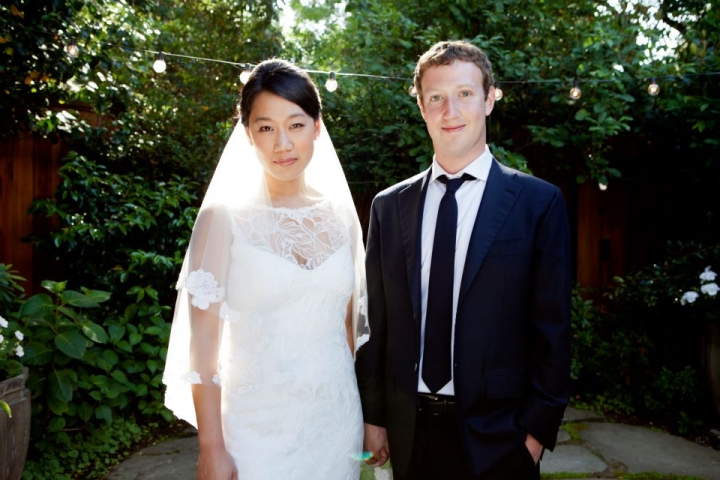 CEO Mark Zuckerberg promises to give 99% of his Facebook shares to charity — eventually.
CEO Mark Zuckerberg promises to give 99% of his Facebook shares to charity — eventually.
Exact phrasing: the stock, currently worth $45 billion, will be donated “during [he and his wife’s] lives.” He’s 31 and she’s 30, so actuarial tables being what they are, by approximately the year 2065.
If Facebook or the Internet or the earth still exist.
Whoop de doo.
I would be far more impressed if Facebook would put some money into the American economy. How? By hiring more workers — a lot more workers. Facebook’s market cap is $300 billion — almost ten times more than GM. GM has 216,000 employees. I’m not sure Facebook could find work for 2 million workers — but 12,000 is pathetic. They might start by hiring a few thousand 24-7 customer service reps so they could respond quickly when some antisocial pig posts your nude photo.
The part of the “ain’t Zuck nice” philanthropist suck-uppery that really has me annoyed is the “charity” bit.
Disclosure: I’m on record as being not at all into charity. If something is important enough to require funding — helping hurricane victims, sending doctors to war zones, poetry — it ought to be paid for by society as a whole, out of our taxes. We shouldn’t allow billionaires to aggregate enough wealth to billionaires in the first place. Partly, this is because it’s unfair. No one can work hard enough to earn one billion dollars. Also because it gives too much control to individuals at the expense of the 99.99% of everyone else.
Unfortunately, we await the revolution. So we still have billionaires running around pretending to be nice (as opposed to where they belong, hanging from a lamppost).
Even by our current dismal standards, however, Zuck is full of crap.
Point one: the Chan Zuckerberg Initiative is not a charity. It’s a limited liability corporation (LLC) that, like any other company, can donate to actual charities but can also invest in for-profit companies.
Point two: this is all about control.
A donation to an independent, classic 501(c) charity can come with strings attached — the money is only for a children’s wing of the hospital, no adults — but it’s ultimately spent by the charity based on its directors’ decisions. Under the LLC structure Zuckerberg will maintain nearly dictatorial control over the funds he’s “donating” to “charity.”
It’s the difference between you giving a hundred bucks to the United Way, and taking a hundred bucks out of your wallet and dropping into a coffee can in your kitchen. Maybe the C-spot in the coffee can will go to the poor. Maybe not. It certainly isn’t accurate to claim you gave it to charity.
If Zuck wants a “gives 99% of his stock to charity” headline, he ought to earn it — by giving 99% of his stock to actual charities. Charities that aren’t named after him. Charities he doesn’t control.
“Zuckerberg To Maybe Eventually Do Things He Deems Good With Some Of His Fortune” would be more accurate.
The vagueness of the Zuckerbergs’ announcement highlights how little anyone should be impressed. “Our initial areas of focus will be personalized learning, curing disease, connecting people and building strong communities,” they said.
Sound familiar?
The Bill and Melinda Gates Foundation was founded in 2000 with billions of dollars Microsoft extracted from American consumers via price gouging and gangster-style monopolistic tactics so ugly the feds almost broke up the company. The charity’s (it’s charted as a 501(c)) mission sounds remarkably similar to those of the Chan Zuckerberg Initiative: “Our foundation is teaming up with partners around the world to take on some tough challenges: extreme poverty and poor health in developing countries, and the failures of America’s education system.”
Which, right out of the gate, meant donating PCs to schools so that fewer kids would grow up using Macs.
If you’re a conservative who thinks government can’t do anything right, let me show you a charity that’s worse. The Gates Foundation wants to destroy teachers’ unions to take away their benefits and drive down their wages — hardly a way to attract the best and brightest young college graduates into the profession. And it has poured millions into the disastrous Common Core, which has created today’s “teach to the test” culture in public schools. Given Zuckerberg’s previous involvement in public schools, a $100 million fiasco in Newark, New Jersey that declared war on teachers, fetishized standardized testing and led to so many school closures that kids wound up walking miles through gang territory to new schools chosen for them by, really, an algorithm — it isn’t a stretch to guess that Chan Zuckerberg will look a lot like Bill and Melinda Gates.
I wouldn’t expect much — much good, anyway — from Zuckerberg on the poverty front, either. After all, Facebook is spreading poverty among American STEM workers by pushing Congress for more H1C visas for foreign workers hired by big tech companies to replace better-paid Americans. Odds are that, here too, the Chan Zuckerberg Initiative’s approach will be similar to the Gateses.
Too young and too rich to have a clue — and the only people they know are over-privileged corporate pigs. How do you think this will turn out?
In 2010, for example, Bill and Melinda drew fire for subsidizing African projects by agribusiness conglomerates Cargill and Monsanto, both notorious for crushing small farmers, to the tune of $23 million. They’re way into sketchy genetically-modified foods. They wind up propping up authoritarian and dictatorial political regimes by focusing on technocratic short-term “quick fix” projects that don’t address the underlying causes of poverty (psst — capitalism). It’s a safe bet Zuck’s anti-poverty stuff will make more people poorer.
It’s Zuckerberg’s billions. He can do what he wants with his money. But let’s not make the mistake of calling him a charitable giver, much less a great guy.
(Ted Rall, syndicated writer and the cartoonist for ANewDomain.net, is the author of the new book “Snowden,” the biography of the NSA whistleblower. Want to support independent journalism? You can subscribe to Ted Rall at Beacon.)
COPYRIGHT 2015 TED RALL, DISTRIBUTED BY CREATORS.COM

